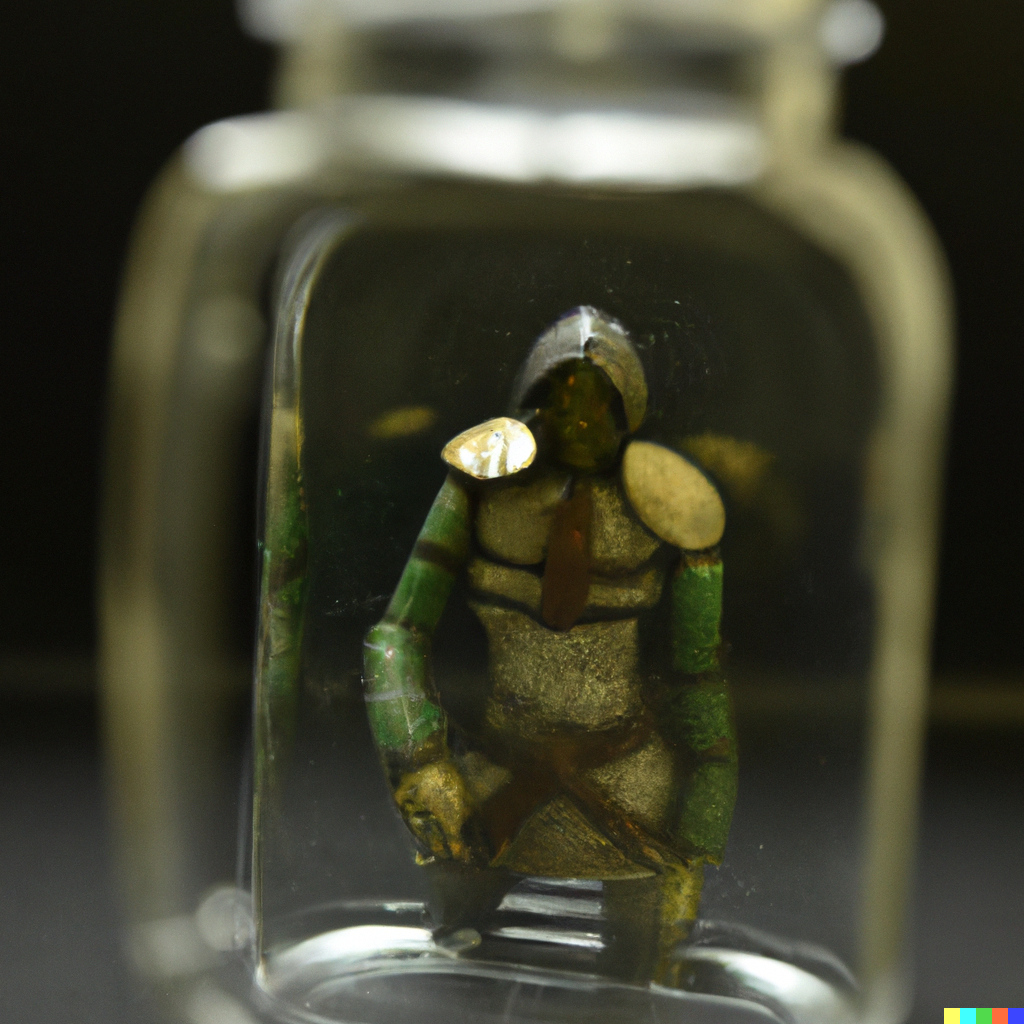The Mason jar, also known as a canning jar or fruit jar, is a glass jar that is commonly used in home canning to preserve food. The jar was named after its inventor, American tinsmith John Landis Mason, who patented it in 1858. The jar's mouth has a screw thread on its outer perimeter to accept a metal ring or "band". When the band is screwed down, it presses a separate stamped steel disc-shaped lid against the jar's rim, creating an airtight seal.
Mason lost his patent for the jar and many other companies started manufacturing similar jars. Over the years, the brand name Mason became the genericized trademark for this style of glass home canning jar, and the word "Mason" can be seen on many Ball and Kerr brand jars. The style of jar is sometimes referred to by common brand names such as Ball jar (in the eastern US) or Kerr jar (in the western US), even if the individual jar isn't that brand.
In early 20th century America, Mason jars became useful to those who lived in areas with short growing seasons. The jars became an essential part of farming culture, and were used at fairs to display jams and pickles for judging and awards. This was a reflection of the labor that went into making the jams. The jams, pickles, and sauces would be given and exchanged as gifts during the holidays as a canned preserved good was of much value. The peak use of Mason jars came during World War II, when the US government rationed food and encouraged the public to grow their own. As migration to cities occurred, and refrigerators became more common, the need for food preservation decreased, leading to a decline in the use of Mason jars.
In the early to mid 2010s, a revival of the Mason jar occurred due to a combination of the rise of thrifting and adoption by hipsters. The jars were used as a novelty by major corporations like 7-Eleven to advertise new drinks, for greenwashing as a zero waste consumer lifestyle, or as a trendy presentation for dessert. In a search for authenticity, the commodification of Mason jars occurred, leading to irony. Drinking out of canning gear highlighted overconsumption and lack of scarcity, the opposite of the intended purpose of the jars. Its utility has been praised for use as a variety of household functional and decorative purposes, such as an oil lantern, soap dispenser, speaker or vase.
On August 15, 2017, the Registrar at National Day Calendar proclaimed National
Mason Jar Day to be observed annually on November 30th, beginning in 2017.
The Mason jar has a rich and fascinating history, starting long before John Landis Mason's patent in 1858. In the early 1800s, French chef Nicolas Appert invented the method of preserving food by enclosing it in sealed containers. Among the earliest glass jars used for home canning were wax sealers, named in reference to the sealing wax that was poured into a channel around the lip to secure a tin lid. This process was complicated and error-prone, but it became popular in the late 1830s or early 1840s and was still used to seal fruit jars until about 1890.
In 1858, tinsmith John Landis Mason patented his screw threaded glass jar or bottle, which would become known as the Mason jar. From 1857, when it was first patented, to the present, Mason jars have had hundreds of variations in shape and cap design. After Mason's patent expired, many other manufacturers produced glass jars for home canning using the Mason-style jar.
The initial form of closure for the glass canning jar was a zinc screw-on cap, the precursor to the modern Mason jar lid. The jars were soldered shut with lead to create a vacuum seal. This was eventually replaced by the tinfoil lid, which was prone to failure and often didn't seal properly. In response to this, the "lightning" jar, a jar with a screw-on metal lid that featured a protruding rim that the user would press down on to seal the jar, was invented. This design was problematic, as the jar had to be held in place to seal it, and it was difficult to open.
In 1882, Henry William Putnam of Bennington, Vermont patented a new type of canning jar that featured a metal lid with a rubber seal. This design was much more effective than the previous designs and became very popular. However, the rubber seal was prone to decay and the metal lids were prone to rusting.
In 1912, Ball Corporation introduced the "perfect" jar, which featured a glass lid and a metal band that held the lid in place.
This design was more reliable and easier to use than previous designs, and it quickly became the most popular design for home canning jars. Today, the Mason jar is still a popular choice for home canning, as well as for a variety of other uses, including storage, decorations, and DIY projects.
In recent years, the Mason jar has experienced a resurgence in popularity, thanks in part to the rise of the "do-it-yourself" and zero waste movements. Many people are rediscovering the usefulness and versatility of the Mason jar, and are using them for a wide range of purposes, from storing food and drinks to creating homemade beauty products and home decor.
One popular use for Mason jars is for brewing and storing cold brew coffee. Cold brew coffee is made by steeping coarse coffee grounds in cold water for an extended period of time, typically 12-24 hours. This results in a coffee that is less acidic and less bitter than coffee brewed with hot water, and has a smoother, richer flavor. To make cold brew coffee with a Mason jar, simply mix coarsely ground coffee with cold water in a jar, seal the jar, and let it steep in the fridge for 12-24 hours. Once the coffee is brewed, you can use the Mason jar's built-in dispensing pump to easily serve it.
Another popular use for Mason jars is for storing and dispensing homemade cleaning products. Many people are opting to make their own cleaning products using natural ingredients like vinegar, lemon juice, and essential oils. These products are often stored in Mason jars, and the built-in dispensing pump makes it easy to dispense the cleaner when needed.
In addition to their practical uses, Mason jars are also popular for their aesthetic appeal. Many people use Mason jars as decorative items, such as for displaying flowers or candles. The clear glass of the jar allows the contents to be easily seen, and the vintage look of the jars adds a touch of nostalgia to any room.
If you're looking for a versatile and stylish way to store and dispense your food, drinks, or cleaning products, a Mason jar is a great choice. You can find a wide range of Mason jars in various sizes and styles at kitchentoolz.com. Check out their selection of 32-ounce glass bottles with dispensing pumps, perfect for storing and serving your cold brew coffee or homemade cleaning products. So why not try using a Mason jar in your home today?
One of the biggest advantages of using Mason jars is their durability and longevity. These jars are made of thick, high-quality glass that is resistant to breaking and cracking, even when exposed to extreme temperatures. This makes them perfect for home canning, as the jars can withstand the high heat of the canning process without breaking.
Mason jars are also easy to clean and maintain. The smooth glass surface of the jar is non-porous, which means that it won't absorb any odors or flavors from the contents of the jar. This makes it easy to clean the jar and reuse it for a different purpose.
In addition to their durability and ease of cleaning, Mason jars are also environmentally friendly. Unlike plastic containers, which can take hundreds of years to break down in landfills, glass Mason jars are fully recyclable. This makes them a sustainable choice for storing and dispensing your food and drinks.
In today's economic climate, many people are looking for ways to save money and be more frugal. Using Mason jars for home canning, storage, and other purposes can help you save money in several ways. First, Mason jars are often less expensive than other types of containers, such as plastic containers or speciality canning jars. Second, using Mason jars for home canning allows you to save money on store-bought canned goods, as you can preserve your own fruits and vegetables at a fraction of the cost. And finally, using Mason jars for storing and dispensing your food and drinks can help you avoid food waste and save money on groceries.
Overall, the Mason jar is a versatile, durable, and cost-effective choice for storing and dispensing your food and drinks. Whether you're looking for a way to preserve your own fruits and vegetables, brew your own cold brew coffee, or create your own cleaning products, a Mason jar is a great choice. So why not celebrate National Mason Jar Day by incorporating these versatile jars into your home? You can find a wide selection of Mason jars at kitchentoolz.com, including 32-ounce glass bottles with dispensing pumps. Happy Mason Jar Day!

